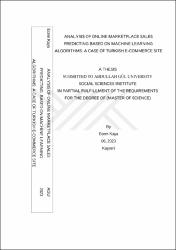Analysis of online marketplace sales prediction based on machine learning algorithms: A case of Turkish e-commerce site
Abstract
Internet shopping has grown in popularity as more of our daily requirements have begun to be addressed online. Learning about the preferences and motivations of customers in the Turkish market and guiding e-commerce platforms to adapt their marketing strategies and increase customer satisfaction is important for both resource allocation and cost minimization. The purpose of this paper is to estimate future sales for popular e-commerce sites based on behavioral factors such as discounts, price or free shipping. Therefore, real-time and experiment-independent data are collected from the sales made by one of Turkey's most popular e-commerce sites. In order to produce predictions, we employ Artificial Neural Networks, Support Vector Regression, K-Nearest Neighbors Regressor, OLS regression, and Nu-Support Vector Regressor. The models developed using machine learning algorithms attempt to estimate the number of sales based on independent factors such as price, discount rate, and user ratings. As the result of this research, we calculate and compare the accuracy of the models with root mean squared errors and R². Günlük ihtiyaçlarımızın çevrimiçi olarak karşılanmaya başlamasıyla birlikte internet alışverişinin popülaritesi de artmıştır. Türkiye pazarındaki müşterilerin tercihlerini ve motivasyonlarını öğrenmek ve e-ticaret platformlarına pazarlama stratejilerini uyarlamaları ve müşteri memnuniyetini artırmaları için rehberlik etmek hem kaynak temini hem de maliyet minimizasyonu açısından önemlidir. Bu makalenin amacı, popüler e-ticaret siteleri için indirim, fiyat veya ücretsiz kargo gibi davranışsal faktörlere dayalı olarak gelecekteki satışları tahmin etmektir. Bu nedenle, Türkiye'nin en popüler e-ticaret sitelerinden birinin yaptığı satışlardan gerçek zamanlı ve deneyden bağımsız veriler toplanmıştır. Tahmin üretmek için Yapay Sinir Ağları, Destek Vektör Regresyonu, K-En Yakın Komşular Regresyonu, OLS regresyonu ve Nu-Destek Vektör Regresörü kullanılmıştır. Makine öğrenimi algoritmaları kullanılarak geliştirilen modeller, fiyat, indirim oranı ve kullanıcı derecelendirmeleri gibi bağımsız faktörlere dayalı olarak satış sayısını tahmin etmeye çalışmaktadır. Bu araştırmanın sonucunda, modellerin doğruluğunu ortalama kare hatası ve R² ile hesaplıyor ve karşılaştırıyoruz.


















